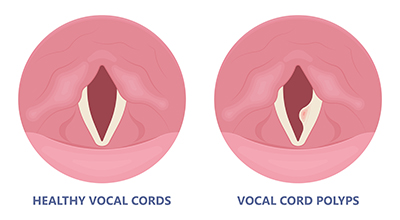Vocal cord polyp

In this section, we will discuss vocal cord polyps, a common condition that can significantly impact your voice and overall well-being.
What are Vocal Cord Polyps?
Vocal cord polyps are noncancerous growths that develop on one or both vocal cords. These soft, swelling-like lesions can occur as a result of vocal abuse or trauma, causing changes in the normal vibration of the vocal cords and subsequent voice problems. Vocal cord polyps can affect individuals of any age or profession, although they are more commonly found in individuals who frequently use their voice, such as singers, speakers, or teachers.
Causes and Risk Factors:
The primary cause of vocal cord polyps is vocal abuse or misuse, which places excessive strain on the vocal cords. Common causes and risk factors include:
1. Vocal overuse or misuse: Consistently using your voice incorrectly, speaking loudly, shouting, or singing with poor technique can contribute to the development of polyps.
2. Acid reflux: Chronic acid reflux can irritate the vocal cords, leading to the formation of polyps over time.
3. Smoking: The inhalation of tobacco smoke can irritate and damage the vocal cords, making them more susceptible to polyp formation.
4. Trauma to the vocal cords: A sudden injury to the vocal cords, such as a violent cough or yelling, can cause polyps to develop.
Symptoms:
The most common symptoms of vocal cord polyps include:
1. Hoarseness: An ongoing hoarse, raspy, or breathy voice, especially after using your voice for an extended period.
2. Vocal fatigue: Difficulty maintaining your normal voice quality, endurance, or volume.
3. Decreased vocal range: Trouble reaching high or low notes while singing or speaking.
4. Voice breaks: Sudden changes or interruptions in your voice quality or pitch.
5. Throat pain: Discomfort, soreness, or a lump-like sensation in the throat during voice use.
Diagnosis:
If you are experiencing persistent voice changes or symptoms mentioned above, it is crucial to consult an Otolaryngologist like Dr. Seejo George for a proper diagnosis. Dr. George will perform a comprehensive evaluation of your vocal cords using a specialized instrument called a laryngoscope. This examination allows for a close examination of the polyps and helps rule out other potential causes of your voice problems.
Treatment Options:
Dr. George will develop an individualized treatment plan based on the severity of your condition and your specific needs. The treatment strategy for vocal cord polyps may involve the following:
1. Voice therapy: Working with a speech therapist who specializes in voice disorders can help improve vocal techniques, reduce vocal strain, and promote vocal healing.
2. Rest and vocal hygiene: Resting your voice, avoiding activities that strain the vocal cords, staying hydrated, and practicing good vocal habits are essential for recovery.
3. Medications: In some cases, medications such as corticosteroids may be prescribed to reduce inflammation and promote healing of the polyps.
4. Surgical removal: If conservative measures do not provide satisfactory results, surgical intervention may be considered to remove the polyps. Surgical procedures, such as microlaryngoscopy, can be performed to address the polyp and restore vocal cord function.
Preventing Vocal Cord Polyps:
While it may not be possible to prevent all vocal cord polyps, there are steps you can take to reduce the risk:
1. Practice proper vocal technique: Ensure you are using your voice correctly, with adequate breath support, and avoiding excessive strain.
2. Rest your voice: Give your vocal cords ample rest, especially after prolonged periods of speaking or singing.
3. Manage acid reflux: If you have acid reflux, controlling it through medication and lifestyle modifications can help protect your vocal cords.
4. Avoid irritants: Steer clear of smoking and exposure to other irritants that can damage the vocal cords.
Conclusion:
If you are experiencing changes in your voice or related symptoms, seeking early intervention from an expert like Dr. Seejo George is important for timely diagnosis and treatment. With personalized care and advanced treatment options, Dr. George and his team will guide you towards improved vocal health, helping you regain your voice with confidence and comfort. Contact us for an appointment or any further inquiries regarding vocal cord polyps or other related conditions.






